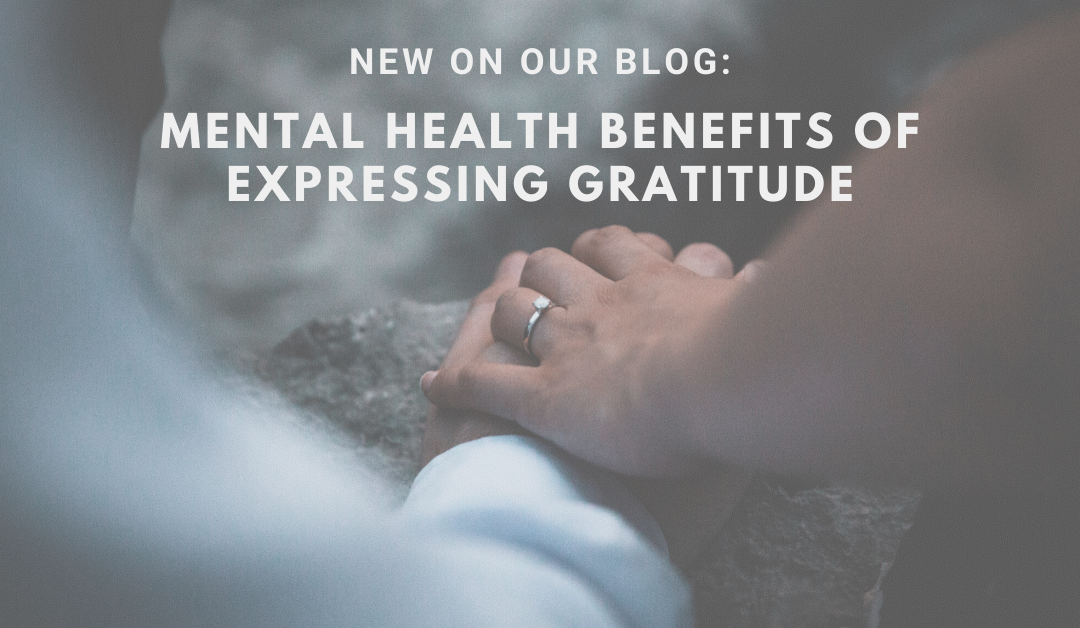
by Sara Hart | Nov 25, 2019 | Blog
The holiday season can bring a mix of emotions to those battling mental health challenges. However, if you choose to reframe the way you look at and respond to certain situations, you might find that you feel recharged and rejuvenated. We encourage you to choose gratitude this holiday season, as allowing yourself to have a grateful mind can positively impact your mental health and well-being. Let us explain!
Gratitude can boost your relationships.
Expressing your appreciation for the relationships you’ve cultivated will make a difference in both your life and theirs. If this makes you feel a little uncomfortable, just remember – chances are they need to hear it more than you know. Text them. Call them. Direct message them. Email them. Visit them in person. The way in which you show your gratitude for others doesn’t matter – just make sure you’ve made it known. Your message of thanks can be as detailed or as brief as you want it to be. A little gratitude can go a long way.
Gratitude can enhance your self-esteem.
Think about how empowered you’ll feel if you stop comparing and begin appreciating. Everyone is following their own path, and grateful people are …

by Sara Hart | Oct 16, 2019 | Blog
For some, the thought of attending a counseling session isn’t easy. In fact, it can feel terrifying. It’s because there’s a stigma placed on mental health – a common misconception that seeing a clinician means there’s something “wrong” with you. We disagree. Asking for help indicates you are taking control of your life and of your mental health. While this can be scary, the things that often scare us are great opportunities for us to step up and grow. You may find that facing your fears will prove to be empowering, rather than petrifying.
Need a little more reassurance? Below, a few South Bay clients share how counseling sessions with our clinicians have impacted their lives.
“I have been attending South Bay for four months. South Bay has helped me regain my morals and values again. It has helped me to build upon my spiritual, physical and mental health. I was at a point where I was lacking in my life, and I needed South Bay. They were right there when I called. Just be open and honest with yourself while you’re here. Work on the issues you need to work on. Allow yourself the opportunity for the staff …

by Sara Hart | Aug 13, 2019 | Blog
It’s common to experience fear when you decide to begin therapy sessions. At first, you may feel uncomfortable speaking about personal issues with someone you don’t know. While fear is a natural emotion, it can be confronted by reframing your anxious thoughts. Below, we offer a few tips on how to overcome your doubts about speaking with a professional clinician.
Decide what you’d like from your clinician.
From the get-go, be open and honest with your clinician about what you need from the session. Do you want someone who will offer advice? Listen silently? Would you like the conversation to be casual or feel more like you’re speaking with an expert? If you express your needs from the beginning, the clinician can then guide the session accordingly. Clinicians will work with you to better understand your needs and help you through life’s struggles.
You don’t have to go into it alone.
If speaking to a professional in a one-on-one setting scares you, you might find comfort in group therapy. In this environment, it’s up to you if you want to share your feelings or just simply listen to others, all of whom are working to navigate similar challenges. Depending on …

by Sara Hart | May 17, 2019 | Blog
It’s not easy knowing there are some aspects of life where we have limited or no control. And, learning how to accept life’s curveballs can be extremely difficult. Just know – feeling overwhelmed by these circumstances is completely understandable, and finding ways to help manage how you cope with these situations can lead you to live a happier, healthier life. Below are steps you can take to cope with things beyond your control.
Determine what you are able to control
When something happens that’s out of your control and it makes you uncomfortable, shift your focus to what you can control – your perception. A new, fresh perspective on various aspects of life can jolt us into a better mindset. You might not be in charge of a situation, but you can certainly dictate your own attitude, reaction and plan of action moving forward. A great way to start is by adopting positive behavioral habits, such as writing your feelings down on paper.
Focus on the present
Most anxieties come from things we can’t change (the past) or things we can’t predict (the future). Try to shift your mindset to focus on the present. Overthinking can be debilitating – use …

by Sara Hart | Jun 22, 2018 | Blog
Trauma can come from various life instances, and the recovery process can look different for different people. For some, it takes a period of time to heal from trauma. For others, seeking professional treatment is necessary for recovery.
Everyday situations might trigger flashbacks, which may lead to feelings of anger, fear, anxiety, guilt or numbness. Coping skills and grounding techniques are used to work through past traumatic experiences, especially when a painful flashback from the event resurfaces.
Below, we offer tips on how you can begin taking steps towards recovering from a traumatic event.
Meditation
Meditation and mindfulness techniques can help you overcome the side effects from trauma. When first learning how to meditate, try using a guided meditation app. One such app is Insight Timer. Insight Timer offers free, guided meditations, meditation music and group discussion options.
Deep breathing
Increased respiration is one of your body’s fight-or-flight responses. During a moment of panic, focus on breathing in deeply through your nose and out through your mouth. Pay close attention to how your body reacts when talking or thinking about the traumatic event and identify coping skills that make your mind and body feel calm. Commonly used coping …





